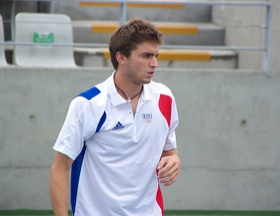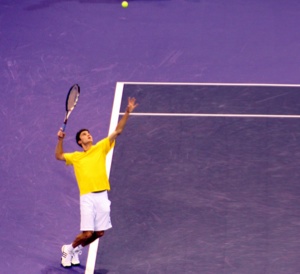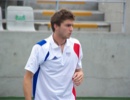First part of the interview with Gilles Simon
 Nice-Premium: Recently in the press, there have been quite a few comments about your ranking as the tenth best player in the world. Does that concern you?
Nice-Premium: Recently in the press, there have been quite a few comments about your ranking as the tenth best player in the world. Does that concern you?
Gilles Simon: No, it doesn’t bother me. There must be a hint of bitterness, but that’s their opinion. They must feel stronger, but I stay focused on my performance. They are not the ones who will make me feel worse. Anyway, I was the same when I was ranked fortieth. If there was a player whom I thought was at my level, I said so. But I don’t play based on their opinions, especially since it’s the previous generation. If it were those from my own generation, it would hurt more, but we know each other so they’ve spoken well of me. The others are surprised because they don’t see me play; they don’t know what I’m capable of. I know I work hard and I’m improving. In six months, you learn a lot. Several of us are 22-23 years old, and we’re evolving together.
N-P: Indeed, there is a lot of talk about these four young players (Monfils, Tsonga, Gasquet, and Simon) in the top twenty. Are you surprised by this ranking?
G.S.: No, not at all. These are players I know, I know what they can do. In the press, they highlight this new generation, so the older ones feel a bit left out. To go back to your previous question, let’s say they have a bit of misplaced pride and ego.
N-P: What’s your opinion on the “Wildcard affair” at the Bercy Masters Series, where the cards were given to younger players rather than older ones who didn’t make it past the first round?
G.S.: It’s important to bet on the young. When you give a wildcard, you don’t do it asking who has the best chance of advancing; otherwise, it would have been given to Fabrice Santoro or Julien Benneteau. Obviously, they have a better chance of advancing than a young player playing on the central court for the first time in the Masters Series. A wildcard is useful for gaining experience and for remembering the expressions they’ve had. Everyone had a tense encounter, but those are feelings they need to master. Regarding the more experienced players, if they say they deserved to be at Bercy, they should have been there by their ranking and not by hoping for a hypothetical wildcard.
 N-P: Regarding Shanghai, do you think about it?
N-P: Regarding Shanghai, do you think about it?
G.S.: For now, I’m staying focused on the tournament. But it’s true that I have to do things I don’t necessarily like, like the visa or the plane ticket. I have no choice, and it means it’s not that far away…
N-P: You play doubles; what’s the point? You could get tired for nothing, right?
G.S.: There is a lot of interest. We overestimate the exertion of energy, because we rarely play more than an hour. It also allowed me to play on the central court and see how the balls react. Otherwise, the only way was to train at eight in the morning. It also allows me to work on important shots on hard courts, like volleys, returns, or second serves that I need to hit harder. Plus, a doubles match is much less intense than a practice session. And if I advance in both brackets, I’ll drop the doubles. That’s why I’m playing with a singles player.
N-P: Lastly, is being recognized by the public important to you?
G.S.: It feels good, especially when people enjoy watching me play and watching a match like the one against Nadal. On the other hand, being recognized in the street doesn’t matter much to me. There’s a lot of talk about new faces. But I keep a cool head regarding overexposure.


